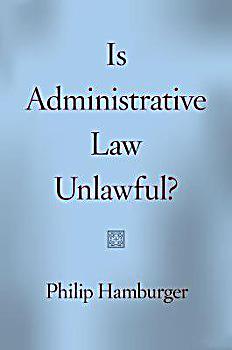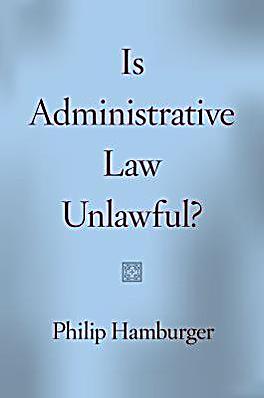Is Administrative Law Unlawful? By Philip Hamburger EBOOK Product Description Is administrative law unlawful? This provocative question has become all the more significant with the expansion of the modern administrative state. While the federal government traditionally could constrain liberty only through acts of Congress and the courts. Hamburger turns to an examination of the Continental, civil law (or civilian) roots of modern American administrative law, with a focus on the famous Prussian scholarship and system of administrative law, the Rechtsstaat, which systematized prerogative law in an attempt to control it, while simultaneously legitimizing it and recognizing a. 'no' review of philip hamburger, 'is administrative law unlawful Philip Hamburger has had a vision, a dark vision of lawless and unchecked power. 1 He wants us to see that American administrative law is unlawful rootand. Book Review: 'Is Administrative Law Unlawful? ' by Philip Hamburger The separation of powers broke down in the 20th century thanks to progressives who believed commissions could quickly improve. The Federalist Society's Long Island Lawyers Chapter presents a discussion featuring: Professor Philip Hamburger Maurice and Hilda Friedman Professor of Law at Columbia University Philip Hamburgers Is Administrative Law Unlawful? is an important attempt address that lack. Through a sophisticated historical account linking administrative power to royal prerogative power, Hamburger argues that administrative law is not a benign modernday invention, but instead a perniciousand profoundly unlawfulreturn to rule by. With Is Administrative Law Unlawful? , Philip Hamburger answers this question in the affirmative, offering a revisionist account of administrative law. Rather than accepting it as a novel power necessitated by modern society, he locates its origins in the medieval and early modern English tradition of. We use your LinkedIn profile and activity data to personalize ads and to show you more relevant ads. You can change your ad preferences anytime. With Is Administrative Law Unlawful? , Philip Hamburger answers this question in the affirmative, offering a revisionist account of administrative law. Rather than accepting it as a novel power necessitated by modern society, he locates its origins in the medieval and early modern English tradition of royal prerogative. With Is Administrative Law Unlawful? , Philip Hamburger answers this question in the affirmative, offering a revisionist account of administrative law. Rather than accepting it as a novel power necessitated by modern society, he locates its origins in the medieval and early modern English tradition of. Philip Hamburger is the Maurice and Hilda Friedman Professor of Law at Columbia Law School. He is a scholar of constitutional law and its history, and his publications include Separation of Church and State (Harvard 2002), Law and Judicial Duty (Harvard 2008), Is Administrative Law Unlawful? (Chicago 2014), and numerous articles. Hamburger, by contrast, suggests that administrative lawby which he means legally binding rules that are developed through unilateral actions by the executive branchhas existed since. In his third section, Hamburger turns to how the administrative state is not only outside the law, but above the law, as shown by the deference of the real judiciary to the administrative states abuses of the law, abuses that would not be countenanced by any other actor because of their extralegal nature. Philip Hamburger is the Maurice and Hilda Friedman Professor of Law at Columbia Law School. He is a leading scholar of constitutional law and its history, who works on many topics, including religious liberty, freedom of speech, academic censorship, judicial review, the office and duty of judges, administrative power, and the early development of liberal thought. Watch videoLarry Parks Interviews Professor Philip Hamburger about his book Is Administrative Law Unlawful? Isn't administrative power constitutional under the Necessary and Proper Clause? Is administrative power modern? Isn't administrative power necessary in contemporary society? To get Is Administrative Law Unlawful? Is Administrative Law Unlawful? Philip Hamburger ISBN: Kostenloser Versand fr alle Bcher mit Versand und Verkauf duch Amazon. Abstract: Philip Hamburger has had a vision, a dark vision of lawless and unchecked power. He wants us to see that American administrative law is unlawful rootandbranch, indeed that it is tyrannous that we have recreated, in another guise, the world of executive prerogative that. Philip Hamburgers Is Administrative Law Unlawful? has been getting much attention in the blogosphere recently. Hamburger guestblogged at the Volokh Conspiracy and his series of posts laid out his position, an emphatic Yes, with admirable clarity and his detractors (Adrian Vermeule. This is a review of Philip Hamburgers book, Is Administrative Law Unlawful? Most scholars believe that administrative law began with the rise of administrative agencies. Answering in the affirmative in this farreaching, erudite new treatise, Philip Hamburger traces resistance to rule by administrative edict from the Middle Ages to the present. This is a magnificent book, simultaneously haunting and bracing. In this book, Philip Hamburger demonstrates, shows, and proves that Americans are currently ruled by a system that the U. Constitution was explicitly designed to prevent. Buy Is Administrative Law Unlawful? Reprint by Philip Hamburger (ISBN: ) from Amazon's Book Store. Everyday low prices and free delivery on eligible orders. With Is Administrative Law Unlawful? , Philip Hamburger answers this question in the affirmative, offering a revisionist account of administrative law. Rather than accepting it as a novel power necessitated by modern society, he locates its origins in the medieval and early modern English tradition of. Is Administrative Law Unlawful? is a work of the very highest quality, a learned scholarly exegesis setting out the intellectual foundationsin medieval and early modern English constitutional thoughtfor the proposition that the contemporary American administrative state is profoundly unconstitutional and unlawful. Philip Hamburger has had a vision, a dark vision of lawless and unchecked power. He wants us to see that American administrative law is unlawful rootandbranch, indeed that it is tyrannous that we have recreated, in another guise, the world of executive prerogative that would have. Philip Hamburger is the Maurice and Hilda Friedman Professor of Law at Columbia Law School. He is a scholar of constitutional law and its history, and his publications include Separation of Church and State (Harvard 2002), Law and Judicial Duty (Harvard 2008), Is Administrative Law Unlawful. Philip Hamburger is the Maurice and Hilda Friedman Professor of Law at Columbia Law School. He is the author of The Administrative Threat, Is Administrative Law Unlawful? , Law and Judicial Duty, and S eparation of Church and State. Is administrative law unlawful? [Philip Hamburger With a clear yet manylayered argument that draws on history, law, and legal thought, Is Administrative Law Unlawful? reveals administrative law to be not a benign, natural outgrowth of contemporary. Is Administrative Law Unlawful? , by Philip Hamburger (University of Chicago Press, 648 pp. , 55) We conservatives like to complain about overregulation and point to this or that destructive rule, but few of us go so far as Philip Hamburger does in his immensely important Is Administrative Law. Answering in the affirmative in this farreaching, erudite new treatise, Philip Hamburger traces resistance to rule by administrative edict from the Middle Ages to the present. the modern administrative state, Hamburger focuses more on restoring courts and curbing judicial deference. Hamburgers attention to the constitutional text notwith It therefore is necessary to consider the possibility that administrative law was an instrument of a class that took a dim view of popularly elected legislatures and a high view of its own rationality and specialized knowledge. Philip Hamburger is the Maurice and Hilda Friedman Professor of Law at Columbia Law School and the author, most recently, of Is Administrative Law Unlawful? Professor Hamburger argues that. 1 No Review of Philip Hamburger, Is Administrative Law Unlawful? (2014) Forthcoming, Texas Law Review Adrian Vermeule Philip Hamburger has had a vision, a dark vision of lawless and unchecked Philip Hamburgers Is Administrative Law Unlawful? is a powerful legal broadside against the American administrative state. Hamburger argues that modern administrative state rulemaking and adjudication are both unlawful and unconstitutional, reminiscent of the practices of English prerogative courts like the Star Chamber and the High Commission during the reigns of James 1st and Charles 1st. With Is Administrative Law Unlawful? , Philip Hamburger answers this question in the affirmative, offering a revisionist account of administrative law. Rather than accepting it as a novel power necessitated by modern society, he locates its origins in the medieval and early modern English tradition of. Administrative lawthe delegation by the legislature of legislative and judicial power to the executiveis the backdrop of every American life, but very few people realize this. Kindle Store Compra un Kindle Applicazioni di lettura Kindle gratuite eBook Kindle Kindle Unlimited Novit: Prime Reading eBook in inglese e altre lingue Accessori Ricondizionati Certificati Forum di assistenza Contenuti e dispositivi Assistenza Kindle Philip Hamburger's book Is Administrative Law Unlawful? will remind readers that much of modern bureaucracy violates the careful separation of powers that the Framers wrote into the Constitution. Hamburger detailed in his 2014 tome how administrative lawif you can call it thatreturns modern government to the historical exercise of prerogative. This is a review of Philip Hamburgers book, Is Administrative Law Unlawful? Most scholars believe that administrative law began with the rise of administrative agencies in the late nineteenth century. Hamburger, by contrast, suggests that administrative lawby which he means legally binding. With Is Administrative Law Unlawful? , Philip Hamburger answers this question in the affirmative, offering a revisionist account of administrative law. Rather than accepting it as a novel power necessitated by modern society, he locates its origins in the medieval and early modern English tradition of. Philip Hamburgers Is Administrative Law Unlawful? is a timely and major contribution to the most significant constitutional crisis of our time. As a work of scholarship it will inform and inspire future thinking on the administrative state for years. With Is Administrative Law Unlawful? , Philip Hamburger answers this question in the affirmative, offering a revisionist account of administrative law. Rather than accepting it as a novel power necessitated by modern society, he locates its origins in the medieval and early modern English tradition of. With a clear yet manylayered argument that draws on history, law, and legal thought, Is Administrative Law Unlawful? reveals administrative law to be not a benign, natural outgrowth of. Philip Hamburger Columbia Law School. Philip Hamburger is the Maurice and Hilda Friedman Professor of Law at Columbia Law School. from Princeton University and his J. He has also taught at the University of Chicago Law School, the George Washington University Law School, the University of Virginia Law School, and Northwestern Law School. Last year, the University of Chicago Press published Is Administrative Law Unlawful? by Philip Hamburger, the Maurice and Hilda Friedman Professor of Law at the Columbia University School of Law. A book by a named professor at a topten school published by a respected academic publisher with a provocative title would seem to be a mustread book for adlaw aficionados. This is a review of Philip Hamburgers book, Is Administrative Law Unlawful? Most scholars believe that administrative law began with the rise of administrative agencies in the late nineteenth.
.jpg)

.jpg)








